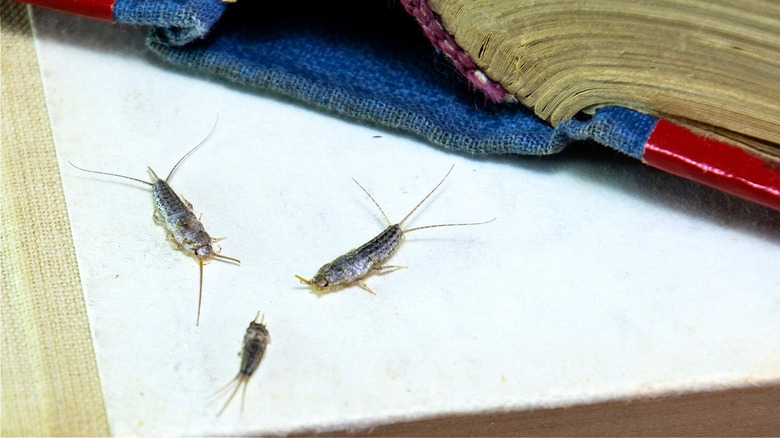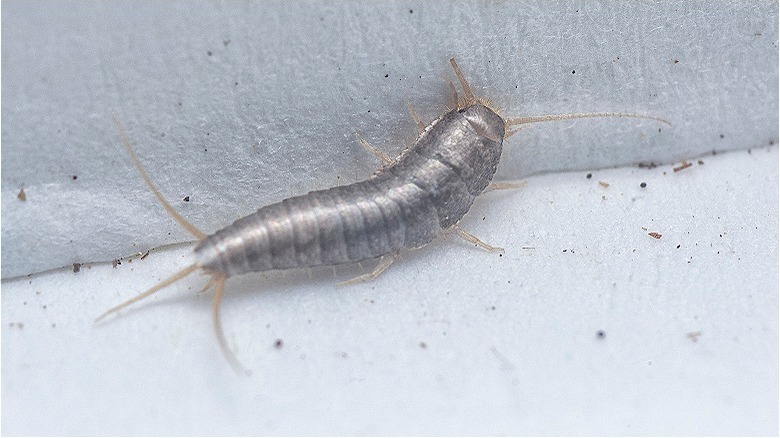Why Silverfish Are Hiding In Your Bed (And What To Do About It)
We may receive a commission on purchases made from links.
When you think of the unwanted guests stealthily making themselves at home in the cozy warmth of your bed, you might imagine hitchhiking bed bugs or hungry mosquitoes as the most likely culprits. But there's another creature that adorns its uninvited badge with pride: the silverfish. This small, silver-gray, and eerily quick insect, distinguished by its fish-like movements, has long, scurrying antennae and a tapered abdomen. Now, you might be wondering: "Why would a silverfish be in my bed?" For those slithery guests, your bed could be the holy grail of their survival necessities: warmth, moisture, darkness, and food.
Indeed, these scurrying troublemakers don't bite nor do they transmit diseases. However, they occasionally shed their skin, which could wreak havoc for those prone to allergies. Complementing your consternation is the knowledge that at the end of a hard day's work, you're sharing your private sanctuary with unwanted guests. But the damage doesn't stop there. Bent on a relentless foraging mission, silverfish can scrape and destroy the materials you hold dear, from clothes and insulation to wallpaper and upholstery. Now, you might be itching (hopefully metaphysically) to learn about the best ways to get rid of silverfish. Options at your disposal span from humidity reduction and a dedicated cleaning routine to deploying essential oils and diatomaceous earth.
Why would silverfish show up in your bed?
Moisture and warmth are among the top answers for why silverfish could be in your bedroom. Thermometer readings between 71 and 90 degrees Fahrenheit, coupled with dampness from indoor humidity, create a haven for them. Behind their lurking in our beds, though, is another likely motive: food. Your bed, seen through the silverfish's eyes, is nothing short of a 24/7 gourmet grocery store brimming with a ton of materials to dine on. These creatures don't restrict themselves to munching on late-night snack crumbs forgotten in the crevices of your sheets or organic matter littering your pillows or mattresses, with dead skin being their prime delicacy. Your books, wallpapers, and even cardboard boxes are no exceptions to the silverfish-feeding frenzy.
To add to the escalating plot, your bed could provide the perfect refuge for the silverfish. Savoring the calm ambiance of the dark, these nocturnal nuisances find a fortress in your well-furnished bed's nooks and crannies, notably if your bedroom lacks access to daylight. And let's not dismiss the possibility of silverfish slipping in through unnoticed gaps, holes, cracks or hitching a sneaky ride inside. Now, spotting a silverfish may be like trying to crack a mystery novel, as they masterfully hide during the day. But if you notice telltale tiny dark droppings akin to peppercorns, skin molts, yellow stains, or feed marks like holes and notches on your treasured belongings, you might have caught a silverfish infestation in the making.
How to get rid of silverfish from your bed
The fight against silverfish infestation begins with shifting your slumber court to a realm of discomfort for these invaders. A dehumidifier underlines the first line of defense: reducing humidity. But should budget considerations prevent this, a moisture absorber pack like the CANAGER Moisture Box, available for $18.99 on Amazon, is an alternative. Still, to maintain a less-humid haven, ensure your bedroom is free from damp fabrics and allow fresh air in.
Next on beating silverfish invasion is transforming your bedroom into an oasis of cleanliness, basking in the knowledge that silverfish are inherently mess lovers. Here, your vacuum cleaner won't just remove dust and debris, but it will pose an existential threat, evicting those silverfish and their eggs from your domain. A comprehensive bedding cleaning spree should help remove the droppings and molted skin of these invaders. In addition, store things with proper organization, and your orderly habitat will seem like a nightmare to these uninvited pests. You also want to keep your bedroom well-lit.
One final strategy against silverfish is to use lavender, peppermint, citrus, or cedarwood essential oil. Concoct a potent weapon by diluting your essential oil choice in a spray bottle with water, then spray the target areas. Note that citrus and peppermint oils are toxic to dogs and cats, per VCA Animal Hospitals (1, 2), while the Canadian Veterinary Medical Association also warns against using lavender oil around cats. If dealing with small-scale invasions, diatomaceous earth can do.


